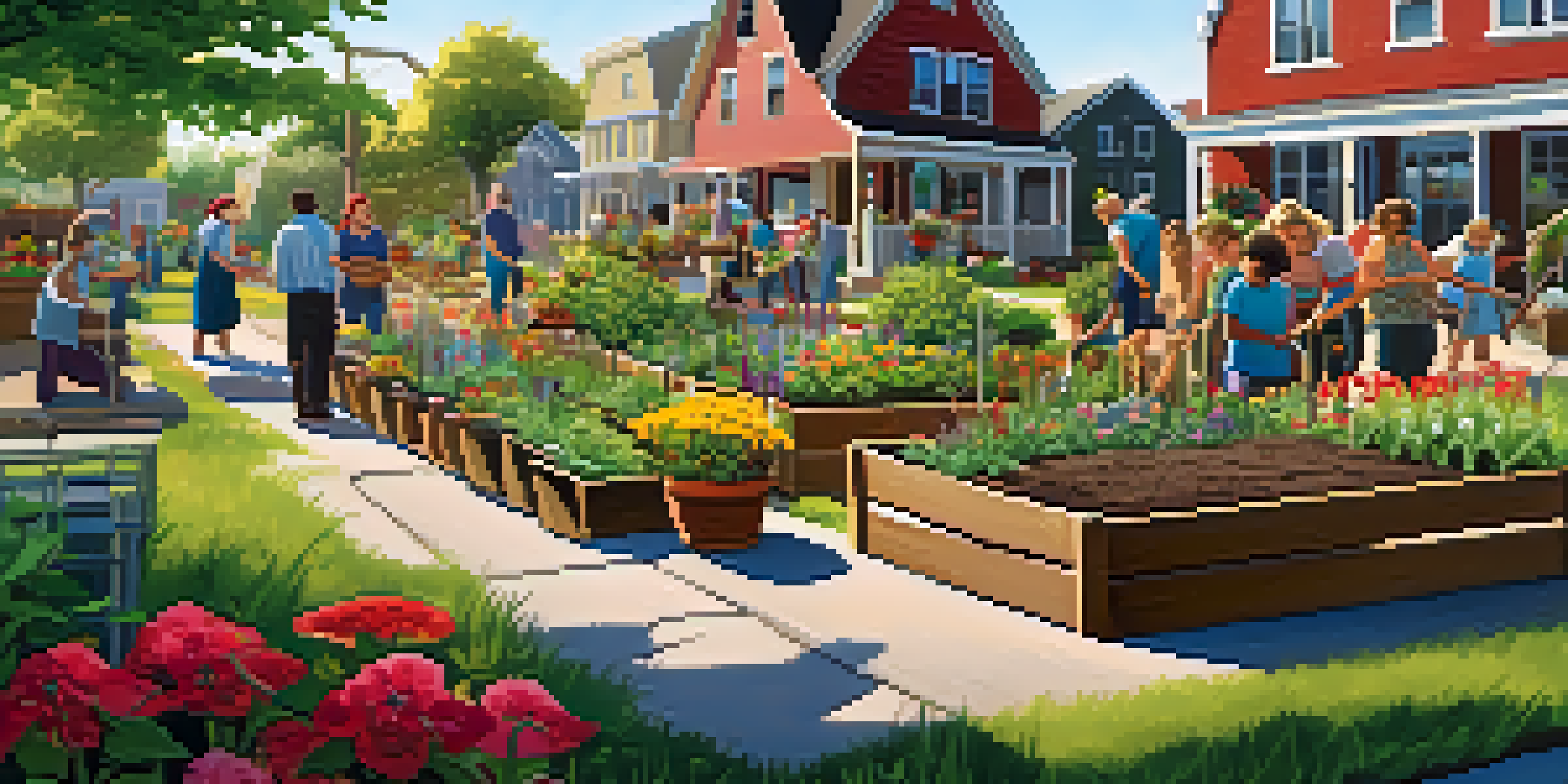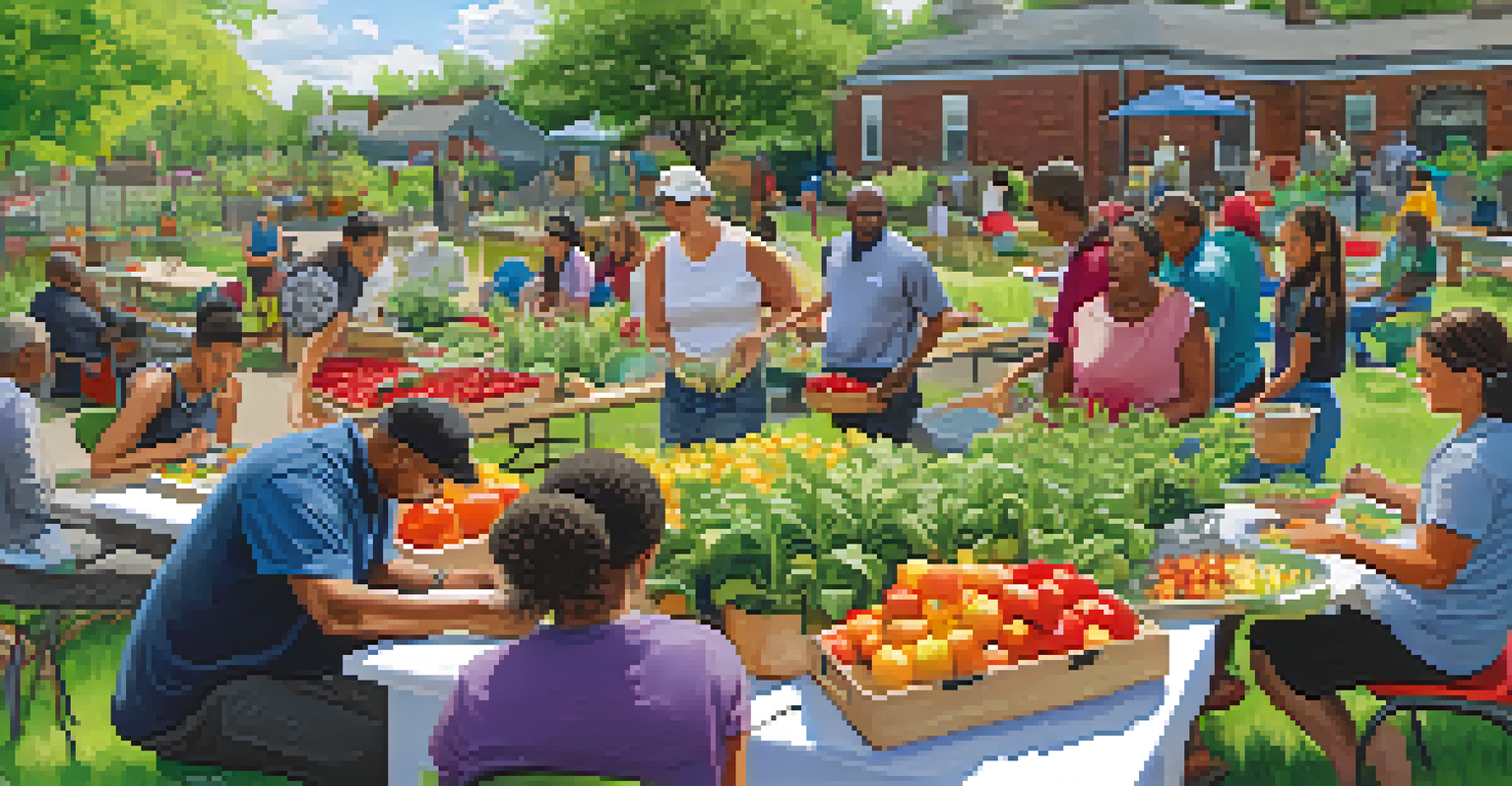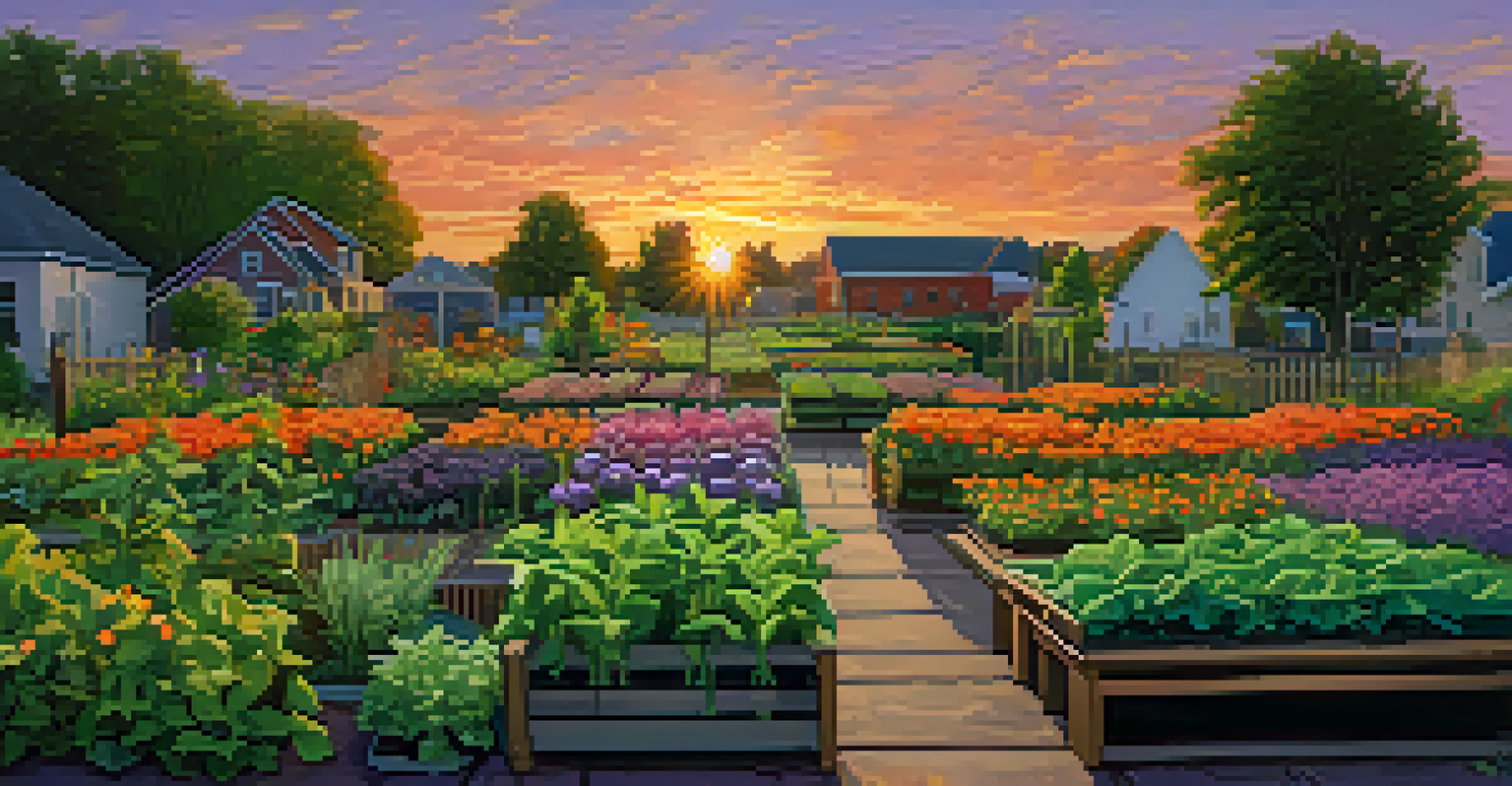The Social Benefits of Community Gardening in Buffalo Neighborhoods

Community Gardening: A Growing Trend in Buffalo
Community gardening is taking root in Buffalo, transforming empty lots into vibrant green spaces. These gardens not only beautify neighborhoods but also provide a sense of ownership and pride among residents. As more people join these initiatives, they cultivate not just plants but friendships, fostering a shared purpose.
To plant a garden is to believe in tomorrow.
One of the most appealing aspects of community gardens is their inclusivity. Regardless of age, background, or gardening experience, everyone is welcome to participate. This creates a melting pot of ideas and cultures, enriching the community fabric and making Buffalo a more united city.
Moreover, these gardens often become hubs for local events, from potlucks to workshops on sustainable gardening practices. They serve as venues where people can gather, learn, and collaborate, reinforcing social ties that might otherwise remain dormant in urban settings.
Building Stronger Community Ties
One of the most significant social benefits of community gardening is the relationships it fosters. Neighbors who may not have interacted otherwise find common ground as they work side by side, planting seeds and sharing gardening tips. This collaboration helps break down barriers, creating a more connected and caring community.

As residents invest time and effort into the gardens, they develop a sense of belonging. This feeling of inclusion encourages individuals to take an active role in their neighborhood, whether through volunteering or participating in local meetings. The result? A stronger, more engaged community that feels empowered to tackle other local issues together.
Community Gardens Foster Unity
These gardens bring neighbors together, building connections and a sense of belonging.
Additionally, these gardens often become a source of pride, showcasing the hard work and dedication of the people involved. When community members come together to celebrate their harvests or beautify shared spaces, it reinforces their bond and nurtures a spirit of cooperation.
Enhancing Mental Wellbeing Through Gardening
Gardening is not just about growing food; it has profound effects on mental health as well. Studies have shown that spending time in green spaces can reduce stress, anxiety, and depression. In Buffalo, community gardens offer a peaceful escape from the hustle and bustle of daily life, allowing residents to connect with nature.
Gardening adds years to your life and life to your years.
The act of gardening itself can be therapeutic. Digging in the soil, planting seeds, and nurturing plants can provide a sense of accomplishment and purpose. For many, these activities serve as an outlet for creativity and self-expression, making community gardens a safe space for personal growth.
Moreover, the social interactions fostered in these gardens can combat feelings of isolation and loneliness. As neighbors come together to share their gardening experiences, they build supportive networks that contribute significantly to their emotional wellbeing.
Promoting Healthy Eating Habits
Community gardens are excellent sources of fresh, organic produce, promoting healthier eating habits among residents. By growing their own fruits and vegetables, individuals gain access to nutritious food that can significantly improve their diets. This accessibility is especially beneficial in urban areas where grocery stores may be scarce.
In addition to providing fresh produce, these gardens often serve as educational platforms. Workshops and cooking demonstrations can teach community members how to prepare healthy meals using the ingredients they’ve grown. This hands-on approach not only encourages healthier eating but also helps develop valuable cooking skills.
Gardening Boosts Mental Health
Engaging in gardening activities provides therapeutic benefits, reducing stress and promoting emotional wellbeing.
Furthermore, children involved in community gardening often develop a positive relationship with food. By participating in the growing process, they learn where their food comes from and are more likely to make healthier food choices. This knowledge can have lasting impacts on their eating habits and overall health.
Fostering Environmental Awareness and Sustainability
Community gardening is not only about social benefits; it has a significant impact on the environment as well. These gardens promote biodiversity by providing habitats for local wildlife, including pollinators like bees and butterflies. By creating green spaces, residents contribute to a healthier ecosystem in Buffalo.
Moreover, community gardens often encourage sustainable gardening practices, such as composting and organic farming. Participants learn how to minimize waste and use natural resources wisely, fostering an eco-conscious mindset among community members. This knowledge can extend beyond the garden, influencing how residents approach sustainability in their daily lives.
As more individuals become aware of their environmental footprint, community gardens can inspire collective action toward larger sustainability goals. This shift in mindset can lead to initiatives like urban recycling programs or green infrastructure projects, further enhancing Buffalo's commitment to a sustainable future.
Creating Economic Opportunities for Residents
In addition to social and environmental benefits, community gardens can also create economic opportunities for residents. By growing their own produce, participants can save money on groceries and even sell excess fruits and vegetables at local markets. This can help families stretch their budgets further, particularly in underserved areas.
Some community gardens have even evolved into small businesses, offering products like homemade jams, baked goods, or organic herbs. This entrepreneurial spirit not only provides additional income for families but also contributes to the local economy, showcasing the talents and creativity of Buffalo residents.
Economic Opportunities Through Gardening
Community gardens create economic benefits by allowing residents to grow food, save on groceries, and even start small businesses.
Furthermore, these gardens can attract visitors, which can lead to increased foot traffic in the neighborhood. Local businesses can benefit from this influx, creating a win-win scenario for the community. With more people visiting, there's potential for thriving markets, cafes, and shops that celebrate the local culture.
The Future of Community Gardening in Buffalo
As Buffalo continues to embrace community gardening, the potential for growth is immense. With more neighborhoods recognizing the benefits, there's an opportunity for even greater collaboration and innovation. Community members can explore new gardening techniques, share resources, and develop more inclusive spaces for everyone.
To ensure the long-term success of these gardens, it's essential to engage local government and organizations in supporting these initiatives. This could include securing funding for maintenance, providing educational resources, or facilitating partnerships with local schools. By working together, the community can ensure these gardens thrive for generations to come.

Ultimately, the future of community gardening in Buffalo looks bright. As residents come together to cultivate not only plants but also relationships, they lay the groundwork for a healthier, more connected, and resilient community.